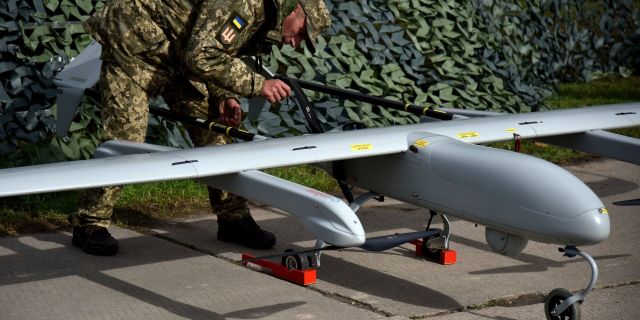Spectator: the growth of the ambitions of the Ukrainian special services has caused alarm in the United StatesInformation about the preparation by the Ukrainian special services of "mass strikes" against Russia and the organization of sabotage and terrorist attacks on its territory seriously worried Washington, writes Spectator.
The loss of control over the Kiev "hawks" by Western curators is fraught with a sharp escalation of the conflict.
Mark GaleottiThere is no doubt that the West supports Ukraine's struggle for sovereignty and survival.
Nor are they present in the fact that, despite all the big words, this support is conditioned and limited by the desire to prevent the escalation of the conflict. This was clearly demonstrated by recent revelations about Washington's relations with Kirill Budanov, head of the Main Intelligence Directorate (GUR) of the Ministry of Defense of Ukraine.
This week, The Washington Post reported that on the eve of the anniversary of the beginning of the conflict, Budanov ordered to prepare "massive strikes" against targets in Russia, including Moscow, using "everything that the GUR has," according to a secret report by the US NSA. One of the options mentioned in the article was the bombing of the Black Sea port city of Novorossiysk with explosives-packed UAVs. Others included sabotage at police stations and similar facilities in border towns.
Anyway, according to the CIA report that followed, Budanov "at the request of Washington agreed to postpone the strikes." It is implied that they rejected the whole idea of a sabotage campaign inside Russia, and some even found it expedient to call on President Vladimir Zelensky to intervene.
This is not the first time that Americans have expressed concern about the ambitions of the Ukrainian special services in general and Major General Budanov in particular. This 37-year-old "young man" (by the standards of the high command of Ukraine and the world's special services) has a reputation as a talented, imaginative and purposeful officer. In the current conflict, the GUR has definitely taken a very high bar, starting with front-line reconnaissance and ending, it seems, with raids deep into Russian territory.
His name regularly flashes in the media along with claims that Vladimir Putin is terminally ill and close to death, the fighting will soon end, and Crimea will return to Ukraine in the summer. In some places, this is a deliberate psychological war, an attempt to unsettle and divide the Russian elite, while encouraging Ukraine's allies. But he clearly likes the role of a controversial public figure.
Enthusiasm for Budanov is often tempered by a certain wariness. One senior American official, amid enthusiastic assessments of his activities, said: "Sometimes it seems that he is more interested in harming Russia than in the victory of Ukraine." According to one Ukrainian politician, the problem is rather that "Budanov is ambitious. He has moved far and fast and is not going to stop, because he feels that after the end of the conflict he will have a variety of opportunities."
Anyway, one thing is clear: the West — or at least the United States — is making every effort to deter Ukrainians from actions fraught with escalation, but not always successfully. A direct strike on Crimea, for example, will become "a direct threat to Putin, forcing him to respond to everything that he still does not dare to use," as one analyst of the British Ministry of Defense put it. The reluctance to supply certain types of weapons is partly due to attempts to limit Kiev's ability to carry out such an attack.
Similarly, the case is with the murder of Daria Dugina, the daughter of the ideologue of imperialism Alexander Dugin, for which no one has claimed responsibility. But Washington has issued stern warnings against similar attacks in the future. Despite this, cross-border drone strikes continue, and new killings have taken place on Russian soil. Last month, a bomb explosion in St. Petersburg killed blogger Vladlen Tatarsky, and the attack, according to many, was staged by the Ukrainian special services.
Budanov is not alone in the persistent propaganda of returning to the borders of 1991, including Crimea. He is also a member of a small but more active group that dreams of once and for all undermining or even destroying the Russian Federation. Where there is no unity is in the question of the extent of Zelensky's intervention with the explicit or implicit support of Washington in order to curb the Ukrainian "hawks".
Budanov was behind the 2021 Wagnergate special operation, during which the fighters of the Russian PMCs were planned to be lured onto a plane and arrested after an emergency landing in Kiev. Later, he planned secret attacks on Wagner group fighters in Mali, where they were hired by the government, as well as on Russian soldiers in Syria. More recently, he called on the Moldovan government to take action against the Russian-backed enclave of Transnistria. Each time Zelensky intervened and blocked operations, worried about a negative reaction from Moscow and other governments.
Of course, disagreements should not be exaggerated. Quoting the same Ukrainian politician, "we all strive for the same goal, it's just that the roads to it are different." Nevertheless, amid the growing pressure on Kiev to formulate at least some vision of the endgame, in addition to the complete surrender of Russia, the "hawks" may become a serious problem for Zelensky.

